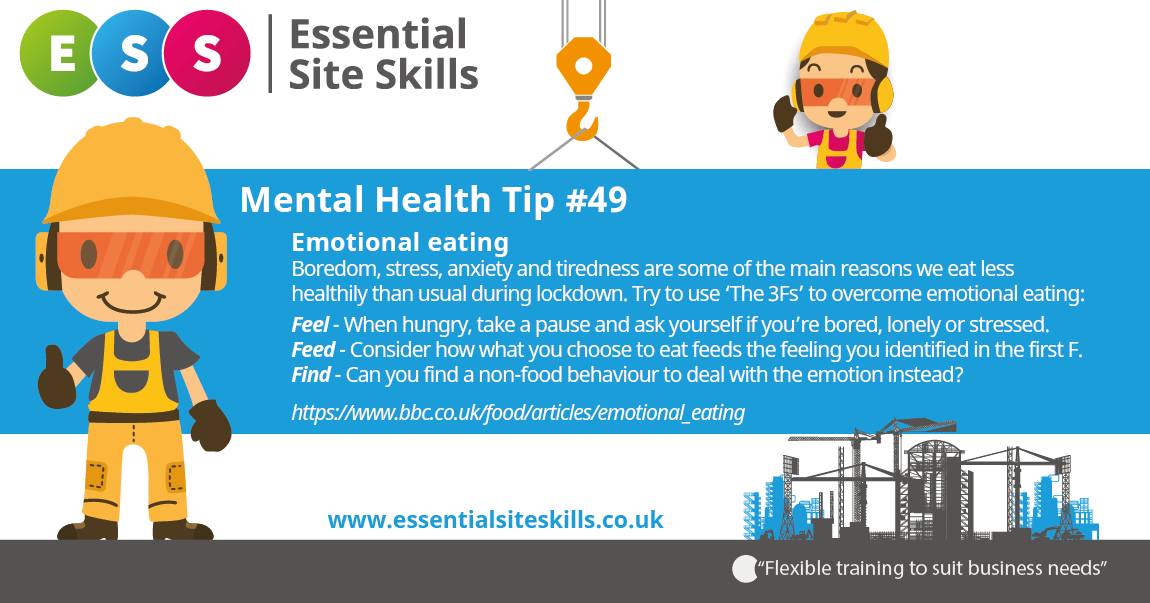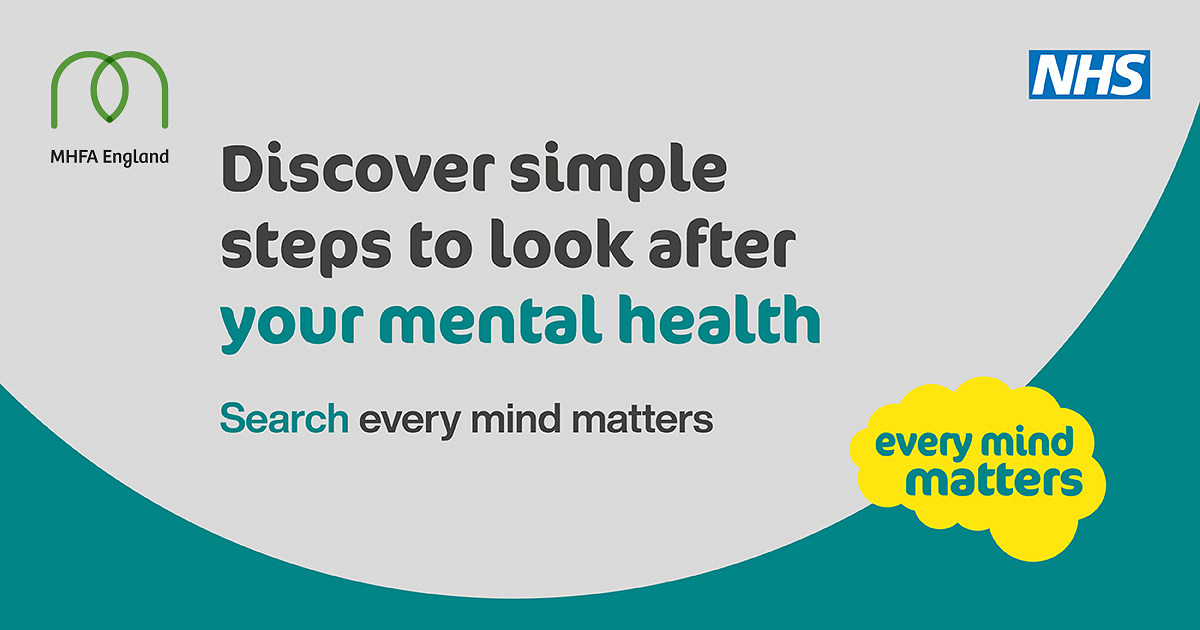Latest News
Tips and Tools to Help You Manage Your Mental Health
Posted on Friday, 26th March 2021

The last year has been incredibly difficult for so many people. The health crisis of the Covid-19 pandemic has also led to unique challenges for peoples' mental health, with lockdown restricting our social, family and working lives.
Over the past year, we have been posting weekly tips on social media to help support your mental wellbeing during the pandemic and beyond. In this week’s blog, we’ll round up a few of these mental wellbeing tips, to provide you with useful resources, guidance and advice.
How do I keep mentally well during COVID-19?
The coronavirus pandemic has had a huge impact on the mental wellbeing of many people. If you find yourself struggling during the Covid-19 crisis, you may want to try some of these techniques and resources:
- During the coronavirus crisis, many people find the amount of bad news overwhelming and emotionally draining. If 24-hour news and constant social media updates are making you worried, try to limit the time you spend watching, reading or listening to coverage of the outbreak to once or twice a day.
- Spending time outdoors can help improve your mood and reduce feelings of stress and anger. But for many at the moment, this isn't possible. Try bringing nature indoors by growing flowers, potted plants, or seeds at home. You could also collect natural materials such as leaves, flowers, feathers, and use them to decorate your living space.
- In response to the mental health crisis brought on by the pandemic, the BBC have launched their Headroom toolkit. The toolkit provides a range of resources to help you cope with the stresses of day-to-day life, including tv shows, podcasts, music mixes, articles, and much more.
- Most people feel lonely sometimes, with the coronavirus and social restrictions causing more people to feel isolated and alone. However, there are still things you can do to help reduce feelings of loneliness.
- If you’re struggling to cope during lockdown, it’s important to go back to the basics. Sleep and exercise have a profound impact on our mental health, but we often let them slide when we’re feeling low. Increasing exercise will help you to improve your sleeping patterns. Consider doing online exercise classes with friends if you can’t exercise outside.
- Boredom, stress, anxiety and tiredness are some of the main reasons we eat less healthily than usual during lockdown. Try to use ‘The 3Fs’ to overcome emotional eating: Feel - When hungry, take a pause and ask yourself if you’re bored, lonely or stressed. Feed - Consider how what you choose to eat feeds the feeling you identified in the first F. Find - Can you find a non-food behaviour to deal with the emotion instead?
You can find out more information on how the Covid-19 pandemic has affected people’s mental health by reading our blog ‘Mental Health During the Coronavirus Crisis’.

How do you deal with mental health at work?
As work takes up a significant portion of many peoples' lives, it's vital to practice good mental health care when working. There are steps you can take to manage your mental health no matter where you work:
- Wellness Actions Plans (WAPs) are an easy, practical way of helping you to support your own mental health at work. Mind have created a guide especially for employees, which includes advice on how to get started and how to approach it with your manager.
- If you feel your workload is spiralling out of control, take the opportunity to discuss it with your manager or supervisor. If you can't resolve the problem of unrealistic goals, organisation problems or deadlines in this way, talk to your personnel department, trade union representative or other relevant members of staff.
- If you've had a mental health problem and been off or out of work, you may worry about going back. But most people find that going back to work is a positive step, and support is available to help ease your way back in. If your job is still open for you, consider talking to your GP before going back to work.
If you want to know more about the steps your workplace can take to ensure the good mental health of all it’s workers, why not read our blog ‘Time to Talk: Why Mental Health First Aid is Vital in Any Workplace.’
How does social media affect mental health?
Social media has never been more vital to the way people communicate and interact with one another. While the internet can be a fantastic way to stay connected with people, it can also have significant negative effects if bad habits are developed:
- “Detoxing” from digital devices is often seen as a way to focus on real-life social interactions without distractions. By forgoing digital devices, at least temporarily, people can let go of the stress that stems from constant connectivity.
- While being online can be helpful for your mental health, there might be times when using online tools could have a negative impact on your mental health. Put some thought into what type of online tool is best for you right now, and think about issues like safety & privacy, online relationships, and online-offline balance.
How to improve mental health
 Mental health is a wide term used to describe your emotional, psychological, and social wellbeing. Having good mental health is essential to living a happy and healthy life. To help you maintain positive mental health, here are some quick tips and tools you can use to improve and manage your mental wellbeing:
Mental health is a wide term used to describe your emotional, psychological, and social wellbeing. Having good mental health is essential to living a happy and healthy life. To help you maintain positive mental health, here are some quick tips and tools you can use to improve and manage your mental wellbeing:
- The NHS has produced a series of mental wellbeing audio guides to help you boost your mood. You can listen to them privately, in your own time, to help you through feelings such as anxiety or a low mood.
- Get a “Mind Plan”. Take this short quiz to get your free plan, designed to help you feel more in control, deal with stress and anxiety, boost your mood and improve your sleep.
- Many people find that physical activity helps them maintain positive mental health. This could be on its own, or in combination with other treatments. Watch this video for five ways to get moving and feel better.
- Research shows that learning new skills can improve your mental wellbeing by helping you build a sense of purpose. Try new hobbies that challenge you, such as writing a blog, taking up a new sport, or learning to paint.
- Being active, enjoying the outdoors and having a healthy, balanced diet all impact how we feel. Also, quitting bad habits like smoking, and cutting down on alcohol and caffeine can have a positive effect on our mood.
How to manage stress and anxiety
Two of the most common mental health problems that most people will experience at some point in their lives are stress and anxiety. While they are something many people have to deal with, some individuals are prone to suffering from these issues more regularly, and to a more extreme extent. If not addressed, they can develop into serious mental health problems. Take some steps to address these issues if you are experiencing sustained periods of stress or anxiety:
- Most people feel stressed sometimes, with some people finding stress helpful or even motivating. But if stress is affecting your life, there are things you can try that may help. Support is available from the NHS for those finding it hard to cope.
- Understanding what causes us stress and taking action to manage our stress levels is a key part of looking after our wellbeing. The MHFA’s interactive stress container tool gives a great overview of the causes and symptoms of stress.
- Developing more positive self-talk is an important way to reduce stress. You can help yourself maintain a positive frame of mind by surrounding yourself with positive energy in your life.
- Doing something you’re good at and enjoying yourself helps beat stress. Doing an activity you enjoy probably means you’re good at it, and achieving something boosts your self-esteem.
- Struggling with anxiety? The Goldberg Anxiety Scale is a useful tool medical professionals use to see how much anxiety is impacting your daily life.
- Feeling low or anxious is a normal response when you've lost your job, been made redundant, or you're struggling with debt. If this starts to happen, facing these situations will generally make them easier. For example, if you're going into debt, get advice on how to prioritise your debts. The NHS now provides tips how to manage financial worries.
How to help someone who is suffering from mental health problems
 If somebody close to you is suffering from mental health problems, be that a friend, colleague, or family member, it can be difficult to know how best to help them. Here is some useful guidance you can use to help those in need around you:
If somebody close to you is suffering from mental health problems, be that a friend, colleague, or family member, it can be difficult to know how best to help them. Here is some useful guidance you can use to help those in need around you:
- If you know someone struggling with their mental health, there are lots of things you can do. Check out the NHS’s Every Mind Matter campaign to see the best steps to take for the person in your life.
- Often it's a partner, family member or carer who first realises that somebody close to them may be suffering from depression. You can help someone that seems down by letting them know you care and are there to listen. Try to be patient and listen to them without judgement.
Mental health courses with ESS
At Essential Site Skills, we provide a range of courses to help you improve mental health practice in the workplace. Some of our courses include.
You can find a full list of the training courses we have available through our online course index. If you have any further questions about our training, you can contact a member of our team by calling us on 0115 8970 529, or sending an email to info@essentialsiteskills.com.


